Busy planting: spring competes for the sun and summer competes for the time.
Solution: at 7: 58 on June 6, 2015, Mangzhong. The awn seed is the ninth of the twenty-four solar terms and the third in summer. On June 6 or 7 every year, the sun reaches 75°C of the Yellow Meridian.
The literal meaning of awn seed is "wheat with awn can be harvested quickly, and rice with awn can be planted", so "awn seed" is also called "busy planting", which is a typical solar term reflecting agricultural phenology. At this time, agricultural production in most parts of China is in the busy season of "summer harvest, summer sowing and summer management".
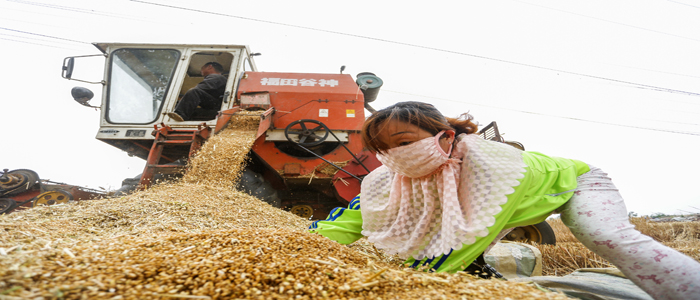
At the end of May, the Central Plains was golden. Now, with the popularization of agricultural mechanization, the timeliness of summer harvest has been greatly improved. The picture shows that farmers in Kaifeng, Henan Province are seizing the time to grab the wheat. Hongyu Liu photography.
The three stages of mango are: the first stage of mantis birth; Second, the cuckoo begins to sound; Three waiting for the tongue to be silent. Mantis eggs break their shells and give birth to little mantis because they feel Yin qi being born; Shrike began to sing in the branches, but mocking bird, who could learn from other birds’ songs, felt Yin qi and stopped singing.
The mango seed rains and the dragon boat festival rises.
During the solar term of awning, the temperature in all parts of the country increased significantly, and the rainfall generally increased. The flowering of jujube trees, Albizia Albizia, cicadas and hibiscus all showed typical midsummer phenology, especially in the middle and lower reaches of the Yangtze River in China, which will enter the rainy season during the awning period.
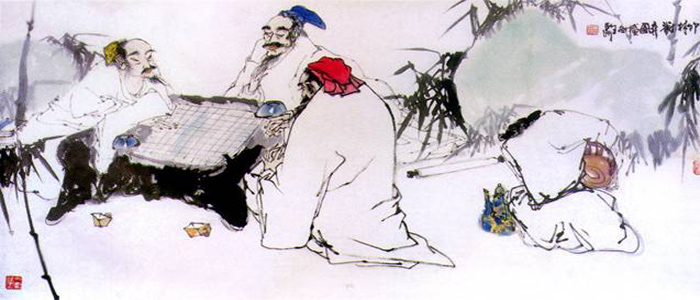
In Poems of a Thousand Families, Zhao Shixiu’s The Guest wrote, "It rains every family in Huangmei season, and frogs are everywhere in the grass pond. If you don’t come to midnight, you will knock the chess pieces and fall to snuff. " In the south of the Yangtze River, there are many rainy days in the ear planting season, which is the most intuitive description of the rainy season. Image source: Network
Hunan, central Jiangxi and southern Zhejiang are the first areas to enter the Meiyu period. After entering the Meiyu period, there are heavy rains from time to time, and secondary disasters such as flash floods and mudslides are also prone to occur in mountainous areas, so we need to be vigilant.
The family is less idle, and the people are twice as busy in May.
Twenty-four solar term: The May Festival means that there is a kind of awn that can be planted. Refers to the awning season, barley, wheat and other awning crops seeds are mature, if it is rainy weather, or even hail disaster, it will make the wheat unable to harvest in time, resulting in lodging and rotten wheat from the field. Therefore, we must seize every favorable opportunity to cut, transport and thresh the wheat, so as to return the grains to the warehouse.
Busy in summer sowing, mainly refers to the autumn harvest crops, such as summer corn, summer soybeans and other summer sowing crops, which need to be planted as early as possible in order to obtain higher yield.
Busy summer management mainly refers to strengthening field management. With the increase of temperature and rainfall, especially the plum rain in the Jianghuai basin, we should timely drain and reduce waterlogging, and pay attention to prevent wet diseases such as rice blast and migratory pests. In the south, we should pay attention to the prevention and control of rice thrips and other pests and diseases.
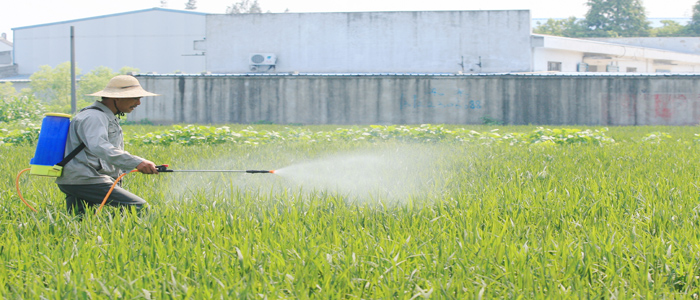
The picture shows that in Jinshan District, Shanghai recently, growers are carrying out field management such as weeding and pest control. Zhangshunchu photography
At this time, cotton, spring corn and other spring crops in the north have entered the growth peak of water and fertilizer demand, so it is necessary not only to apply fertilizer and replenish water, but also to weed and prevent pests and diseases. There is little rain in the northeast and northwest areas, so spring wheat should be watered and topdressed in time, and the management work in the later growth stage should be done well.
Dragon Boat Race with Mang Species Sacrificing to the Flower God
The Dragon Boat Festival falls on the fifth day of the fifth lunar month every year, which is mostly in the solar term of the awn species. The Dragon Boat Festival is a traditional festival of the Han nationality and some ethnic minorities in China, which has continued the old customs of our country for more than 2,000 years. On this day, every household hangs bells, hangs mugwort calamus, eats zongzi, races dragon boats, drinks realgar wine, wears sachets, swims in all diseases, prepares Li and other customs.
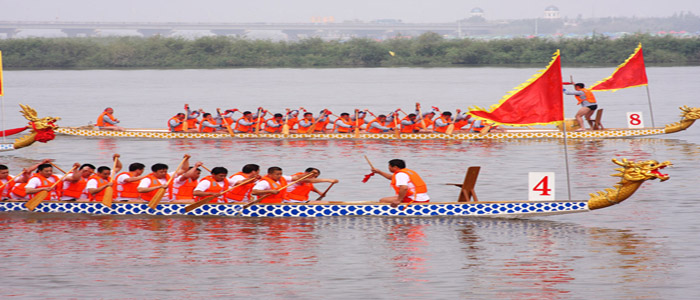
According to historical records, the custom of dragon boat racing on the Dragon Boat Festival has a long history, just like eating zongzi, it is also to commemorate Qu Yuan. When people are rowing dragon boats, the dragon boat songs, which are used to sing for fun, are also widely circulated. Image source: Network
It’s nearly May, and the flowers are beginning to wither and fall. People often hold a ceremony of offering sacrifices to the flower god on the day of the ear seed to send the flower god back to his place, and at the same time express their gratitude to the flower god, hoping to meet again next year. However, this custom no longer exists today.
Every time the rice is planted, all parts of southern Anhui will hold Anmiao sacrificial activities to pray for a bumper harvest and the villagers’ safety.
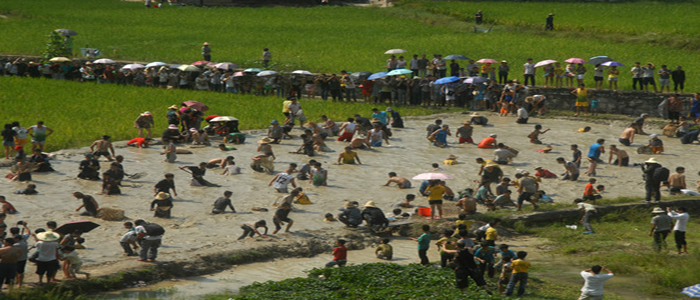
Young men and women of the Dong nationality in the southeast of Guizhou will hold a mud fight festival before and after the awn planting. The picture shows the mud fight scene. Image source: Network
Health-preserving, refreshing, calming and nourishing
Sun Simiao, a famous doctor, said that "it is always appropriate to light sweet and light things, big wheat koji and japonica rice are better" and it is the most appropriate to use it in the solar terms of awn seeds. After the awn seed, the hot summer officially kicked off, and the diet should be based on light and damp food. You can eat more "melon" foods appropriately to achieve the effects of light summer heat, heat and detoxification. In addition, we should pay special attention to the supplement of water, so that the body is in a balanced state and prevent diseases before they happen.
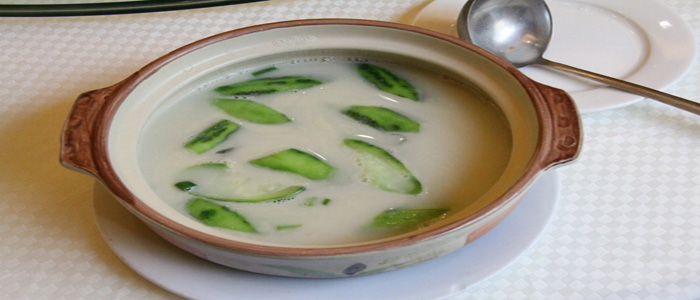
Luffa is rich in a variety of amino acids, vitamins and minerals such as calcium, phosphorus and iron needed by the human body. It also contains active ingredients such as saponin and cucurbitacin for disease prevention and health care. Eating more Luffa in the ear season will help to remove summer heat, clear the heart and stimulate the spleen. Image source: Network
Because of the hot weather, people should pay attention to replenish water to keep the body in a balanced state. On the other hand, due to the increase of air humidity, patients with arthritis should pay special attention to dehumidification, while patients with spleen and stomach deficiency should reduce acid and increase bitterness in diet and regulate stomach qi.
In order to avoid heatstroke, it is necessary to take a bath often after the awn seeds, which can make the skin loose and the "yang fever" easy to vent. However, it is important to note that you should not take a bath immediately when sweating. "Sweating will not make you wet." If sweating will make you wet, it will easily breed acne.
(Editor: Zhao Tianyu)
关于作者